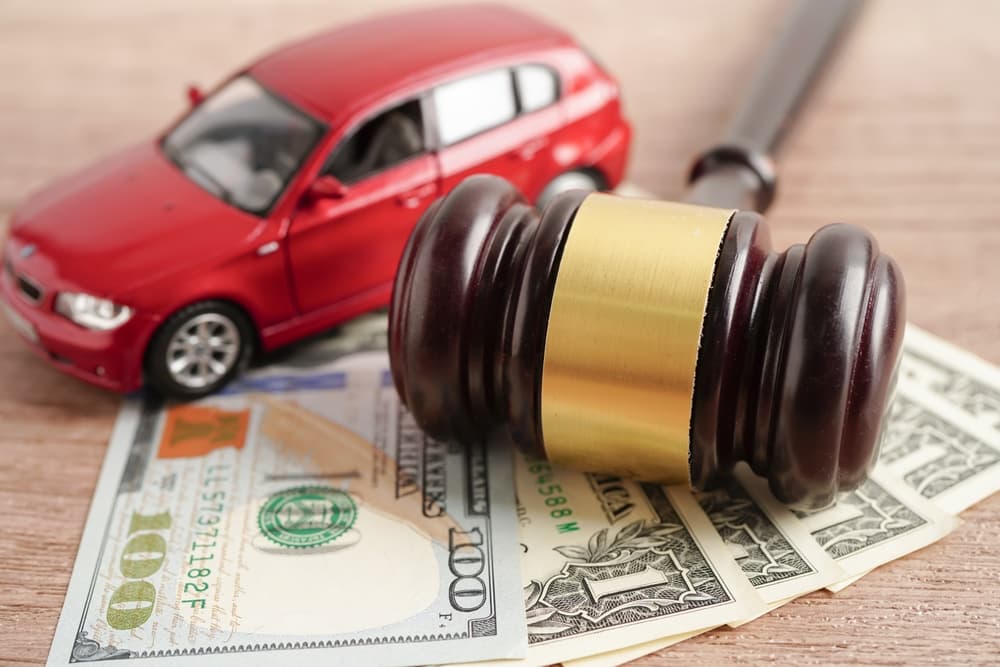Stephen Hasner | Car Accidents | October 26, 2025

After a serious car accident, you may be left dealing with vehicle damage and mounting medical expenses, unsure of the true value of your claim. Unfortunately, many accident victims in Georgia settle for far less than they deserve because they don’t fully understand how to determine a fair car accident settlement amount.
Insurance adjusters may seem polite and helpful, offering quick settlements to close your claim. However, accepting the first offer can mean losing out on full compensation. An experienced car accident lawyer can assess your medical bills, lost income, property damage, pain and suffering, and long-term injuries to determine your claim’s true value.
After a car accident in Atlanta, Savannah, or anywhere in Georgia, the aggressive litigators at Hasner Law fight to recover maximum compensation for injured clients. Call 678-888-HURT (4878) for your free consultation.
Key Takeaways About Car Accident Settlements
- Settlement values depend on medical expenses, lost income, pain and suffering, and future costs related to your injuries.
- Insurance companies typically make low initial offers that don’t reflect the full value of your claim.
- Georgia’s modified comparative negligence rule reduces your settlement if you share fault for the accident, and bars recovery if you’re 50% or more at fault.
- An experienced car accident attorney calculates all economic and non-economic damages to demand appropriate compensation.
- Accepting a settlement ends your ability to pursue additional compensation, even if your injuries worsen later.
Key Factors That Determine Your Georgia Car Accident Settlement Value
The value of a car accident settlement in Georgia depends on several key factors. Each element reflects the financial and personal impact of the crash, and together they determine the total compensation you may recover. Major factors include:
- Medical Expenses: Hospital stays, surgeries, rehabilitation, prescriptions, and medical equipment often make up the largest portion of a claim. Your settlement should account for both past costs and future treatment needs if your doctor expects ongoing care.
- Lost Income: You may be compensated for missed wages and reduced earning capacity if your injuries limit your ability to work. This includes used vacation time, lost bonuses, or commissions. Self-employed individuals can show income loss through tax returns and business records.
- Property Damage: Georgia law allows recovery for vehicle repairs, fair market value if your car was totaled, rental expenses, and damage to personal belongings inside the vehicle.
A skilled Georgia car accident attorney can assess these factors, gather supporting documentation, and negotiate with insurers to secure a settlement that reflects the full extent of your losses.
Economic Damages in Georgia Car Accident Claims
Economic damages reflect the measurable financial losses caused by a collision. These include medical bills, lost wages, and other documented expenses that show the true cost of your injuries. Georgia courts require solid proof for these claims, so keeping detailed records is important.

Your medical care creates a record that supports your case. Save every insurance statement, pharmacy receipt, and invoice from healthcare providers. Hold on to documentation for anything you paid out of pocket, including travel costs for appointments.
Lost income also extends beyond your regular paycheck—it can include missed bonuses, commissions, or raises, as well as reduced earnings if your injuries forced you into a lower-paying position. In cases involving long-term disabilities, an expert may estimate your lifetime earning capacity to support your claim.
Home modifications and adaptive equipment can also qualify as economic damages. Expenses for ramps, handrails, modified vehicles, or specialized furniture are part of restoring your financial stability. A skilled Georgia car accident attorney can help identify all losses that should be included in your settlement demand.
Non-Economic Damages and Pain and Suffering in Georgia Car Accident Claims
While economic losses are supported by paperwork, non-economic damages address the personal impact of the crash. These damages recognize how physical pain, emotional distress, and changes to your quality of life affect you each day. Under Georgia law, these losses are compensable.
Pain and suffering may include ongoing discomfort, chronic pain, or the emotional effects of trauma, such as anxiety, depression, or post-traumatic stress. A Georgia car accident attorney will document these experiences carefully to reflect how your injuries have shaped your daily life.
Loss of enjoyment applies when you can no longer take part in activities you once loved, like sports, exercise, or spending time with family. Scarring and disfigurement also carry lasting emotional weight, especially when they affect appearance or confidence.
Attorneys often use a multiplier method to estimate these damages by comparing them to economic losses. While not an exact formula, it provides a foundation for negotiation and helps communicate the extent of your suffering to insurance companies or a jury.
How Georgia’s Comparative Negligence Law Impacts Compensation
Georgia follows a modified comparative negligence rule under O.C.G.A. § 51-12-33, which adjusts your recovery based on your share of fault. If you are found partially responsible for the collision, your compensation decreases proportionally. However, if you are 50 percent or more at fault, you cannot recover damages.
Insurance companies often use this rule to argue that you contributed to the accident—by speeding, being distracted, or failing to yield. Some of these claims are valid, while others are simply negotiation tactics meant to reduce their payout. A knowledgeable car accident attorney in Georgia can gather evidence, such as witness statements, video footage, and expert analysis, to establish who truly caused the crash.
Building a persuasive case is especially important in disputed liability claims, where insurers may try to assign you a higher percentage of fault. Through detailed investigation and strong advocacy, your attorney can protect your rights and pursue the full compensation allowed under Georgia law.
Common Mistakes That Can Reduce Your Car Accident Settlement
Avoiding these common errors can protect the value of your claim and strengthen your position during negotiations. A skilled Georgia car accident attorney can help guide you through the process and prevent these missteps:
- Posting on Social Media: Sharing photos or updates after a car crash can hurt your claim. Insurance companies and defense attorneys review social media for posts that make your injuries appear less serious. Even lighthearted comments or pictures can be taken out of context.
- Accepting the First Settlement Offer: Early offers from insurers are often far below your case’s true value. Once you sign a release, you can’t seek more compensation if your condition worsens. Always consult a Georgia car accident lawyer before accepting any settlement.
- Delaying Medical Treatment: Failing to seek prompt or consistent care allows insurers to question your injuries. Timely medical visits and complete records strengthen both your recovery and your claim.
- Giving Recorded Statements Without Legal Guidance: Speaking to the at-fault driver’s insurer without representation can be harmful. Adjusters often ask leading questions to make you appear at fault or minimize your injuries.
Working with an experienced attorney early in the process helps you avoid these costly mistakes and strengthens your claim. With proper legal guidance, you can focus on recovery while your lawyer handles negotiations, protects your rights, and pursues fair compensation under Georgia law.
When to Settle or Go to Trial in a Georgia Car Accident Case
Most car accident cases in Georgia resolve through settlement, but deciding whether to accept an offer or go to court depends on the strength of your case and your individual needs. Settling provides faster, guaranteed compensation, while a trial offers the possibility of a higher award but carries greater risk and delay.
Settlement often makes sense when fault is uncertain, your injuries have healed, or the insurance company’s offer reasonably covers your losses. If liability is disputed under Georgia’s comparative negligence law or medical issues complicate your case, trial may not be the best choice.
Going to trial can be worthwhile when liability is clear, your injuries are serious or permanent, or the insurer refuses to offer fair compensation. Cases involving traumatic brain injuries, spinal cord damage, or severe burns may benefit from a jury’s evaluation rather than a settlement.
The timing of recovery also matters. Reaching trial in Georgia can take time, so individuals who need immediate funds for medical bills or living expenses may prefer to settle.
Those who can wait may pursue a larger recovery in court.
A knowledgeable Georgia car accident attorney can assess your case, explain your options, and help you choose the approach that best supports your long-term goals.
How Insurance Policy Limits Impact Your Settlement
The at-fault driver’s insurance coverage often determines the maximum amount available for your car accident settlement. In Georgia, drivers must carry at least $25,000 per person for bodily injury, but many have only this minimum. When your damages exceed those limits, recovering the full value of your claim becomes more challenging.
If your losses go beyond the at-fault driver’s policy, several options may help close the gap. Your own underinsured motorist (UIM) coverage can provide additional compensation if the other driver’s policy isn’t enough to cover your injuries. Because many Georgia drivers have minimal coverage, carrying UIM protection can make a major difference in recovering full compensation.
You may also pursue the at-fault driver’s personal assets, though most individuals have limited means beyond their insurance. Collecting through wage garnishment or property liens can take time and often yields little. Insurance companies are aware of this and sometimes refuse to settle within policy limits, forcing victims to sue to pursue a judgment.
When multiple parties share responsibility, the available insurance funds increase. For example, truck accidents on Georgia interstates such as I-75, I-85, or I-16 may involve both the driver’s policy and the trucking company’s larger commercial policy. Rideshare collisions may include coverage from Uber or Lyft in addition to the driver’s personal insurance, and product defect claims may bring a manufacturer’s policy into play.
An experienced Georgia car accident attorney can identify all potential sources of coverage, evaluate policy limits, and develop a strategy to pursue the maximum recovery available under state law.
The Role of Medical Documentation in Settlement Negotiations
Comprehensive medical records form the foundation of a strong car accident claim. Treatment notes, test results, and physician reports connect your injuries directly to the crash and help counter insurance company efforts to minimize your compensation.
- Seek Prompt Medical Care: Visit a doctor within 24–48 hours, even if symptoms seem minor. Early treatment documents your condition and establishes a clear link to the accident.
- Be Thorough and Accurate: Describe all symptoms and their effects on your daily life. Detailed records—such as notes about neck pain, headaches, or sleep problems—carry more weight than vague descriptions.
- Follow Treatment Plans: Attend all appointments, complete therapy, and take prescribed medications. Missed visits or inconsistent care can weaken your claim.
- Document Future Needs: Ask your doctor to outline any expected long-term treatment, therapy, or limitations. This supports compensation for future medical expenses and lost earning capacity.
Consistent and detailed medical documentation tells the story of your recovery and strengthens your attorney’s ability to negotiate a fair settlement.
How Hasner Law Values Your Georgia Car Accident Claim
At Hasner Law, our attorneys take a detailed, personalized approach to every car accident case in Atlanta, Savannah, and across Georgia. We don’t rely on formulas or accept the insurance company’s assessment of your claim. Instead, we analyze your medical records, employment history, and personal circumstances to determine how the crash has affected your life.

Your settlement should reflect all financial, physical, and emotional losses. Our team works with medical and financial experts to document every category of damages and build a complete, evidence-based claim. With over 80 years of combined experience and more than $1 billion recovered for clients, we know how to maximize case value through strong negotiation and skilled advocacy.
While you focus on recovery, our attorneys manage every interaction with insurance adjusters and fight to secure the full compensation you deserve under Georgia law.
FAQs for Car Accident Attorneys
How long do I have to file a car accident lawsuit in Georgia?
Under O.C.G.A. § 9-3-33, you have two years from the date of the crash to file a personal injury lawsuit. Missing this deadline usually means losing your right to compensation. Limited exceptions exist, but starting early gives your attorney time to gather evidence and build your case.
What if the insurance company denies my claim?
A denial is not always final. Insurers sometimes reject valid claims to discourage you from pursuing them. An attorney can review the denial, identify issues, and challenge it if appropriate. If the insurer refuses to pay, your lawyer may file a lawsuit and present your case in court.
How much is the average car accident settlement in Georgia?
There is no set average. Settlements depend on injury severity, medical expenses, lost income, fault, insurance coverage, and negotiation strength. Minor injuries may settle for thousands, while serious or permanent injuries can reach much higher. A Georgia car accident attorney can evaluate your case for a more accurate estimate.
Do I need a lawyer if the insurance company made me an offer?
Initial offers are often much lower than your claim’s true value. A lawyer can determine whether the offer covers all medical expenses, lost income, and future care. Many people who accept early settlements later realize they were underpaid. A free consultation can help you make an informed decision.
What if I’m partially at fault for the accident?
Georgia’s modified comparative negligence rule reduces your recovery by your percentage of fault. If you are 50 percent or more responsible, you cannot recover damages. Insurance companies often overstate fault to lower payouts. A skilled attorney can gather evidence and advocate for a fair determination of responsibility.
What happens if the at-fault driver has no insurance or leaves the scene?
If the at-fault driver has no insurance or if you suffer injury in a hit-and-run accident, your Uninsured Motorist (UM) coverage on your own auto insurance policy pays for your damages.
UM coverage operates as if the other driver carried a policy, protecting you from uncompensated losses. A car accident attorney can help you file a claim against your own UM policy and maximize that recovery.
Contact Hasner Law to Speak with a Georgia Car Accident Attorney
Insurance companies focus on protecting their profits, not your recovery. They often make low settlement offers and hope you will accept less than your case is worth. You need an advocate who understands the full value of your claim and is prepared to fight for the compensation you are entitled to receive.

Your consultation is free, and you pay nothing unless we win your case. Call Hasner Law at 678-888-HURT (4878) or contact us online to speak with an experienced Georgia car accident attorney today. The sooner you reach out, the sooner we can begin building your strongest case for fair compensation.


